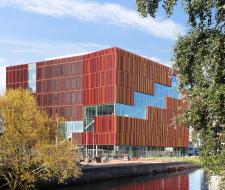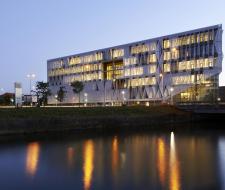Higher education in Denmark for international students
-
 from 9250.00 € / yearApply with documents
from 9250.00 € / yearApply with documents -
 from 19000.00 $ / yearApply with documents
from 19000.00 $ / yearApply with documents -
 from 13000.00 $ / yearApply with documents
from 13000.00 $ / yearApply with documents -
 from 1622.00 $ / yearApply with documents
from 1622.00 $ / yearApply with documents -
 from 1000.00 $ / yearApply with documents
from 1000.00 $ / yearApply with documents -
 from 8000.00 € / yearApply with documents
from 8000.00 € / yearApply with documents -
 Apply with documents
Apply with documents -
 #6 in Best Global Universities in Denmark
#6 in Best Global Universities in Denmark DenmarkCopenhagenCurrently watching: 2from 18000.00 € / yearApply with documents
DenmarkCopenhagenCurrently watching: 2from 18000.00 € / yearApply with documents -
 from 4350.00 € / semesterApply with documents
from 4350.00 € / semesterApply with documents -
 Apply with documents
Apply with documents
Alternative destinations
Education information
Nowadays, higher education abroad for many foreign applicants is the key to a successful career, a high position in society and a decent salary. But, unfortunately, not all young people understand that to achieve such a dream requires complete dedication and a clear vision of the goal to which you need to strive.
To get a higher education in Demark seems interesting because of the European quality and high level of education. Competitive tuition fee is also another advantages of studying in Denmark. Those who care about the future, most often think about getting a higher education abroad — to enroll in a foreign university and get a valuable diploma. Moreover, recently, the fundamental factor in this is not the prestige of the educational institution, but the level of knowledge and prospects for subsequent employment.
Higher education abroad is most popular to receive in English due to its globality. But foreign students, if we talk about higher education in Denmark for foreign students, also choose Danish because of the future perspectives of job offer in Denmark. For better job in future in Denmark applicants should know Danish.
Higher Education in Denmark: An Insight for International Students
Denmark’s higher education system aligns with the European credit-earning model, offering a range of programs for foreign students.
1. The Danish University Experience
Foreign students should be prepared for the rigorous academic environment at Danish universities. Bachelor's programs typically involve 4-5 subjects per semester, concluding with comprehensive semester-end tests and regular knowledge assessments every three months. However, educational staff and tutors are readily available to assist with both academic and domestic queries.
2. Diverse Educational Programs in Denmark
-
Foundation/Pathway Programs: Designed for international students needing an additional year of study to align with the Western educational system.
-
Bachelor’s Degree: A 3-4 year program with variations including basic, advanced, and Bachelor of Arts degrees.
-
Pre-Masters Programs: Serving as a bridge for those planning to pursue higher education abroad.
-
Master’s Degree: A 1-3 year program focusing on research and project implementation.
-
MBA: A specialized 2-year program in various business fields, preparing students for managerial roles.
-
University Transfer/Pathway Programs: Prepare students for direct entry into the second year of a bachelor's program.
-
Advanced Courses: Offer additional qualifications for career advancement.
3. Admission Requirements for Bachelor’s Programs
Enrollment in bachelor’s programs in Denmark typically requires completion of 12 years of secondary education. International students may need to complete a year or two at a local university or pass specialized Danish exams. In exceptional cases, a foreign educational certificate with high scores and language proficiency may suffice.
4. Fees and Costs of Higher Education in Denmark
For non-EU students, the average tuition ranges from 10,000 to 15,000€ per year, which is relatively affordable by European standards. The quality of education is comparable to leading global institutions.
5. Master’s and Postgraduate Studies
Master's programs take 2-3 years, requiring a bachelor's degree for admission. Postgraduate programs, often free, last 2-3 years.
Advantages of Higher Education in Denmark
-
High scientific and pedagogical standards of faculty.
-
Immersive educational process.
-
Exposure to long-standing traditions.
-
Networking opportunities for future employment.
-
Wide range of programs covering all knowledge areas.
-
Small class sizes for personalized attention.
-
Safe and conducive learning environment.
Challenges for International Students in Denmark
-
Financial aspects: While Denmark offers relatively affordable fees, some institutions can be expensive.
-
Documentation and visa application processes can be challenging.

What advice do you have for those aspiring to attend top universities?
Thoroughly research your chosen university, including tuition fees, as these can vary widely. Prepare well for English proficiency tests like IELTS, which are essential for admission to any university. Focus on your preferred courses, checking their specific academic requirements, and ensure you are well-prepared in those areas.
Top 10 universities in Denmark
- International Business Academy (IBA) ;
- Technical University of Denmark (DTU);
- University of Southern Denmark (SDU;
- Københavns Universitet;
- IT University of Copenhagen IT;
- Aarhus University;
- University of Copenhagen;
- Copenhagen business school;
- Roskilde University;
- VIA University College.
In conclusion, higher education in Denmark offers a robust and diverse learning environment with various programs catering to international students. With its balance of quality education and affordable fees, Denmark stands out as an attractive destination for students seeking to study abroad.
General statistics on education in Denmark - rankings, majors, universities
Learning programs-summary information
| Name | Meaning | Equivalent | Min. age | Duration, years |
Next stage | Cost |
|---|---|---|---|---|---|---|
| GCSE | General certificate of secondary education | secondary education (non-accomplished) | 14 | 1–2 | A-Levels | 15,000 USD+ |
| A-Levels | Advanced level | secondary education (accomplished) | 16 | 2 | University | 15,000 USD+ |
| BTEC | Business and Technology Education Board | secondary special education | 14 | 2–3 | University/ work | 15,000 USD+ |
| Oxbridge Preparation | Preparing for Oxford and Cambridge | secondary education (accomplished) | 17 | 1 | University | 15,000 USD+ |
| International Baccalaureate | International baccalaureate | secondary education (accomplished) | 16 | 2 | University | 18,000 USD+ |
| Foundation/ Pathway Year | Preparatory year | admission to the 1st year of university | 17 | 1 | University | 14,000 USD+ |
| NCUK | The Northern consortium | 2 year university | 17,5 | 1 | 2 year University of NCUK | 13,000 USD+ |
| Special Preparation (Medics/Math/Business) | Specialized training | - | 14 | optional | optional | 4,000 USD+ |
| Academic English | Academic English | Language school | 8 + | 6–12 months | School or University | 8,000 USD+ |
Top 15 best universities in Switzerland 2024
| 1 | Glion Institute of Higher Education Switzerland |
| 2 | Les Roches International School Montana |
| 3 | César Ritz Colleges Switzerland |
| 4 | IHTTI School of Hotel Management |
| 5 | Ecole Hoteliere de Lausanne |
| 6 | Geneva Business School |
| 7 | EU Business School Montreux |
| 8 | HIM Hotel Institute Montreux |
| 9 | Swiss Hotel Management School |
| 10 | Webster University Geneva |
| 11 | Business and Hotel Management School |
| 12 | Luzern IMI |
| 13 | Swiss Hotel Management School (SHMS) Caux |
| 14 | International University in Geneva |
| 15 | Culinary Arts Academy Switzerland |



